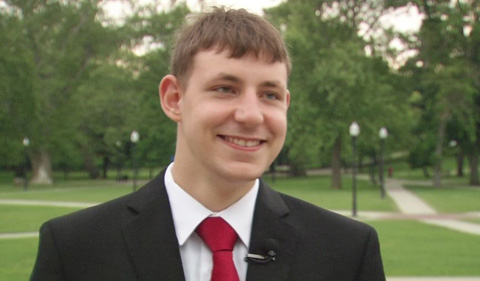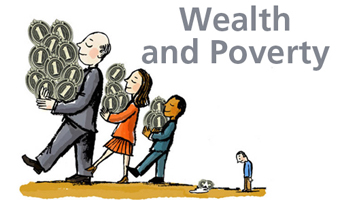
Michael Outrich
By Madeline Weir
Michael Outrich’s passion for geography is apparent the second the word comes up.
“I always had a passion for maps and geography,” says Outrich, who began his undergraduate career as a Meteorology major before pursuing Geographic Information Science, in which he recently earned his bachelor’s degree.
“Everything is tied to geography,” says Outrich. “It’s one of the first things they told us in our physical geography class… and I’ve never forgotten that. Poverty, you can map it.”
The GIScience major includes extensive study in geographic information systems, annotated simply as GIS. Loosely defined as the visualization of geographic data through digitization, GIS is an explosively growing field in geography and one with which all geography students are encouraged to become familiar – says Outrich, chuckling, “I get calls from employers to this day looking for a GIS specialist. I’m in grad school so I’m like, ‘Call me back in three years.’”
While Outrich is drawn to the practicality of GIScience, his interest in it lies more deeply in the social imbalances often examined through geography; in particular, he is passionate about wealth distribution and the underlying causes of social inequity, including poverty. Outrich has personal experience with poverty through his own upbringing, as well as through humanitarian work he’s undertaken in Appalachia.
‘I Had Questions’ about Wealth and Poverty
This has tied in closely with his studies in geography, he says, particularly while in pursuit of the Wealth & Poverty Certificate offered by the Wealth & Poverty theme. Headed by Dr. Yeong Kim, Associate Professor of Geography, a specialist in globalization and economic development, the certificate includes a variety of electives that comprehensively examine the nature of wealth and poverty both globally and locally. Outrich first learned of the certificate through Kim.
 “I had questions,” says Outrich, “like what makes people part of wealth or poverty? It is decisions they make? Working in Appalachia, I saw that there were regions that had higher poverty than others and I started to ask the question ‘Why?’”
“I had questions,” says Outrich, “like what makes people part of wealth or poverty? It is decisions they make? Working in Appalachia, I saw that there were regions that had higher poverty than others and I started to ask the question ‘Why?’”
In fact, Outrich encourages anyone who is curious about the logistics of economic and social development to pursue the certificate. “Who should pursue this certificate? Anyone going into humanities or anyone who wants to do anything regarding people’s social well-being,” Outrich says. “Obviously it doesn’t give you the solution to the problems, but [the certificate] forces you to acknowledge them and challenge your perceptions.”
The certificate, which takes around two years to complete and includes electives in areas such as social work, women’s studies, geography, economics, human development and global health, addresses problems such as wealth distribution and inequality with a focus on the ways that factors such as class, gender and race influence everything from a person’s educational opportunities to what they eat on a daily basis.
Certificate ‘Lit a Fire under Me’
“The person who says they know it all? They don’t know it all. You’re constantly a student in life,” says Outrich about the certificate’s impact on his life both academically and personally. “Something will always come around and change your perspective as long as you’re open to it, and that’s how I’ve changed…. It’s definitely improved my perspective and made me a better human being and a better planner.”
When asked to elaborate, Outrich, who is currently pursuing his master’s degree in City and Regional Planning at the Ohio State University, cited gentrification as an area in which his viewpoint has altered due to his studies in Wealth and Poverty.
“I would definitely jump onto the bandwagon of people who want to develop instead of taking into account the social perspectives had I not had the certificate,” he says. “I would have said ‘Okay, I have all the facts, I’m going to make this neighborhood better and then you can’t afford to live in it anymore.’ Because that’s what gentrification is.”
In addition to tying in closely with his pursuit of a city planning degree, Outrich says the Wealth & Poverty certificate was highly relevant to his studies in Geographic Information Science.
“Poverty, you can map it,” says Outrich, who goes on to express his surprise upon learning through the certificate that inequality in general is growing, and its ties to economic standing are undeniable – the ability to tie this in with geography, particularly with GIScience, was to Outrich very impactful.
“Maps are a very, very powerful tool,” he says. “It’s one thing to throw up charts of data [but with GIS you get] to give it a place and show that these are homes, this is where people live.” Outrich says he hopes to use his experience with GIS software and the knowledge he’s gaining in graduate school to solve issues of inequality and social justice. “I want to be able to help people, to help them get out of poverty…. I already had the empathy… but [the certificate] lit a fire under me to make a change.” He goes on to say, “[This approach] is a lot less prescriptive and more on the playing field of the person you’re trying to help.”
About the Wealth & Poverty Certificate, Theme
Again, students with an interest in social justice, humanitarianism, development, globalization, health care or economics are encouraged to pursue the Wealth & Poverty Certificate. An interdisciplinary theme that critically examines the causes of poverty internationally and locally, Wealth and Poverty allows students a holistic view of wealth distribution and appeals to employers seeking people who are compassionate and educated about the underlying social causes of poverty.
Classes counting toward the certificate are offered in Fall, Spring and Summer semesters. Students pursuing the certificate are required meet with Dr. Yeong Kim to register for the certificate and must then complete a minimum of 18 hours of coursework from the approved electives within the theme.
Those wishing to learn more about the Wealth & Poverty theme can check out courses and activities, including service learning courses.



















Comments